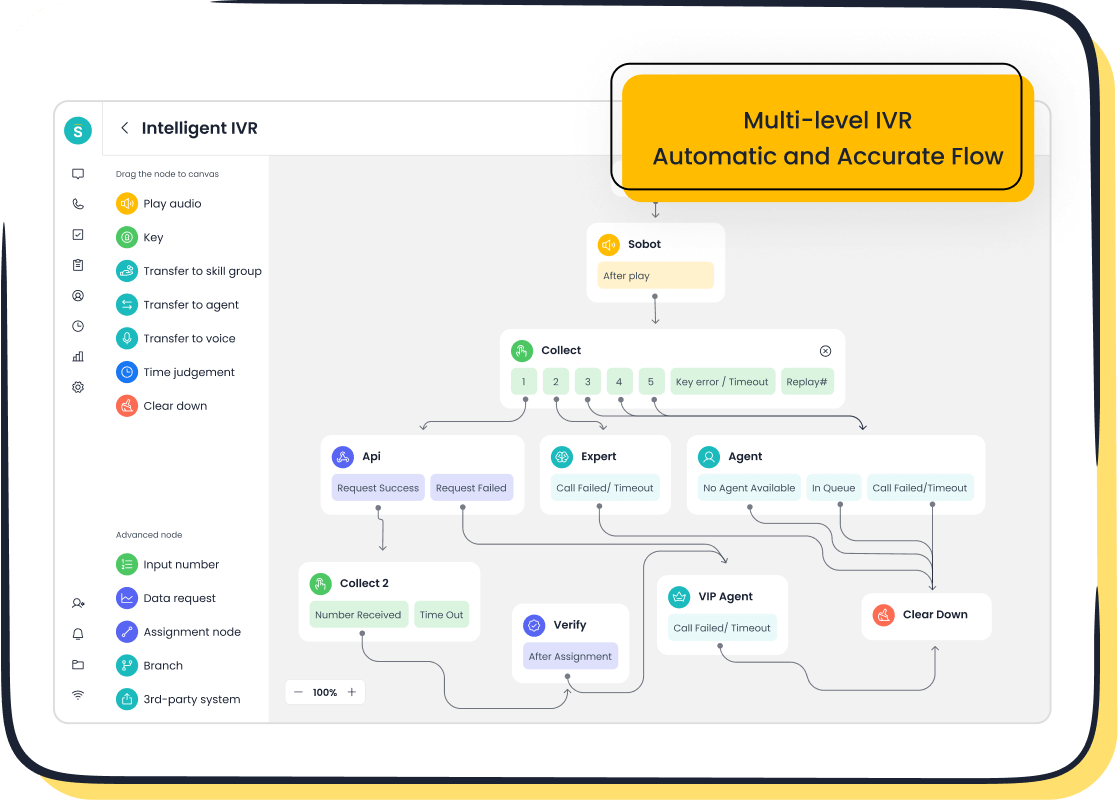What Are the Roles of a Call Center Agent

Call center agents play a vital role in shaping the customer service experience. They handle inquiries, resolve issues, and ensure customer satisfaction. However, challenges like high call volumes and repetitive tasks often lead to agent burnout. Emerging trends, such as AI assistants and remote work models, are transforming call center operations. Tools like Sobot’s Voice/Call Center empower agents by streamlining workflows and enhancing efficiency. By addressing these challenges, you can create a seamless customer service environment that fosters trust and loyalty.
Who Is a Call Center Agent and Why Are They Essential?
Definition and Overview
The role of a call center agent in customer service
A call center agent, also known as a customer service representative, acts as the first point of contact between a business and its customers. You manage customer inquiries, provide information about products or services, and resolve complaints. Your role ensures that customers receive accurate and timely assistance, which directly impacts their overall customer service experience. Whether you work in retail, finance, or technology, your ability to maintain real-time communication with customers is crucial for building trust and loyalty.
Types of call center agents: inbound, outbound, and hybrid
Call center agents can specialize in different roles. As an inbound call center agent, you handle incoming calls, addressing customer concerns or providing technical support. Outbound call center agents focus on making calls, often for sales, follow-ups, or surveys. Blended call center agents combine both roles, offering flexibility to meet business needs. Each type plays a unique part in delivering excellent customer service and ensuring customer satisfaction.
Importance in Business Operations
Representing the company’s brand and values
As a contact center agent, you represent the face of the company. Your communication style, problem-solving skills, and professionalism reflect the company’s brand and values. For instance, when you use tools like Sobot’s Voice/Call Center, you can streamline workflows and provide seamless service. This efficiency helps you leave a lasting impression on customers, reinforcing their trust in the brand.
Building customer trust and loyalty through effective communication
Your ability to communicate effectively is essential for fostering customer loyalty. Studies show that 78% of consumers value competent service agents as the key to a positive experience. When you resolve issues promptly and empathetically, you not only meet customer expectations but also enhance their satisfaction. Remember, every unresolved issue or repeated call can reduce customer satisfaction scores by 15%. By addressing concerns on the first call, you contribute to a stronger relationship between the customer and the business.
Key Roles and Responsibilities of a Call Center Agent
Managing Inbound Calls
Addressing customer inquiries and providing accurate information

As an inbound call center agent, you are responsible for answering inbound customer calls promptly and professionally. Customers often reach out with questions about products, services, or policies. Your role involves handling customer inquiries by providing information that is both accurate and timely. For example, if a customer asks about a product warranty, you must deliver clear details to avoid confusion. Using tools like Sobot’s Voice/Call Center, you can access customer data instantly, ensuring a seamless customer service experience. Meeting performance metrics, such as call volume and response time, is also part of your duties.
Resolving complaints and troubleshooting technical issues
Managing customer complaints is another critical responsibility. You must listen actively to understand the issue and offer effective solutions. For instance, if a customer faces a technical problem with a product, you may need to guide them through troubleshooting steps. Empathy plays a vital role here, as it helps you connect with the customer and build trust. Tools like Sobot’s AI-powered Voicebot can assist by handling repetitive queries, allowing you to focus on resolving complex issues.
Handling Outbound Calls
Conducting follow-ups and gathering customer feedback
Making outbound calls is essential for maintaining strong customer relationships. You might follow up on previous interactions to ensure customer satisfaction or gather feedback to improve services. For example, after resolving a complaint, you can call the customer to confirm their issue has been addressed. Sending warm-up messages before calls can increase engagement, while building rapport during the call fosters trust.
Promoting products and services through upselling
Outbound call center agents often engage in up-selling and cross-selling. You need deep product knowledge to highlight benefits effectively. For instance, if a customer purchases a smartphone, you could recommend accessories that enhance their experience. Active listening helps you identify customer needs, while empathy ensures your suggestions feel genuine. This approach balances promoting products with maintaining trust.
Maintaining Customer Records
Documenting interactions in CRM systems
Documenting calls accurately is a vital part of your duties. Using a robust CRM system, you can record key details like customer concerns and resolutions. Following a consistent format ensures clarity and completeness. For example, summarizing the main points of a call instead of noting every detail saves time and improves efficiency. Sobot’s unified workspace simplifies this process by centralizing customer data.
Ensuring data accuracy for future reference
Accurate record-keeping enhances future interactions. When customer information is up-to-date, you can provide personalized experiences. For instance, if a customer calls again, having their history readily available allows you to address their needs quickly. Regular updates to documentation ensure records remain relevant and useful.
Collaborating Across Teams
Coordinating with departments to resolve complex issues
You often encounter customer problems that require input from multiple departments. For example, a billing issue might involve both the finance and IT teams. In such cases, your role as a call center agent becomes pivotal. You act as the bridge, ensuring seamless communication between teams. This collaboration speeds up resolving customer issues and enhances the overall experience.
Cross-team collaboration also brings measurable benefits. Employees feel more engaged when they work together toward a common goal. It fosters a collaborative culture, builds trust, and reduces redundancies. The table below highlights additional advantages:
| Benefit | Description |
|---|---|
| Higher employee engagement | Employees feel more invested in the company mission through collaboration. |
| A more collaborative culture | Trust among teams fosters camaraderie across departments. |
| Increased revenue | Collaborative departments generate more revenue than isolated teams. |
| Lower expenses | Sharing data helps identify and eliminate redundancies. |
| A better customer experience | Seamless collaboration leads to improved customer satisfaction and loyalty. |

Using tools like Sobot’s Voice/Call Center simplifies this process. Its unified workspace allows you to share customer data with other departments instantly, ensuring faster resolutions.
Sharing customer insights to improve products and services
Your daily interactions with customers provide valuable insights that can shape business strategies. By documenting calls and analyzing recurring issues, you help identify product defects or service gaps. For instance, if customers frequently report a specific technical glitch, your feedback can guide the product team to address it.
You also play a role in understanding consumer expectations. Customers often share what they want or need during conversations. This information helps marketing teams create targeted campaigns. Additionally, identifying common queries allows businesses to enhance self-service options, such as FAQs or chatbots.
Your insights go beyond customer-facing aspects. They can highlight inefficiencies in internal processes or weaknesses in training programs. For example, if you notice repeated errors in handling outbound call center agents’ tasks, this feedback can lead to better training modules. Tools like Sobot’s AI-powered Voicebot further assist by analyzing call data, making it easier to share actionable insights across teams.
Essential Skills for Call Center Agents
Communication and Interpersonal Skills
Active listening and clear articulation
Strong communication skills are the foundation of excellent customer service. As a call center agent, you must master active listening and attention to detail. This involves focusing entirely on the caller, acknowledging their concerns, and responding thoughtfully. For example, when a customer explains an issue, paraphrasing their words shows you understand their needs. Clear articulation is equally important. You should convey information in a concise and straightforward manner to avoid confusion. Techniques like mirroring the caller’s tone and using probing questions can help establish a connection and ensure clarity. These skills not only enhance customer satisfaction but also build trust and rapport.
Adapting communication styles to diverse customer needs
Every customer is unique, and their communication preferences vary. You must adapt your style to suit their needs. For instance, a technical-savvy customer may prefer detailed explanations, while another might appreciate simplified instructions. Authenticity and empathy play a key role here. By mirroring the customer’s tone and using relatable language, you create a positive experience. This adaptability ensures you deliver excellent communication skills, even in challenging situations.
Empathy and Patience
Understanding customer emotions and concerns
Empathy is one of the most essential skills for call center agents. It allows you to understand the customer’s emotions and view the situation from their perspective. Research shows that 70% of buying experiences depend on how customers feel they are treated. For example, acknowledging a customer’s frustration over a delayed order can ease their concerns. Active listening further enhances this connection, making the customer feel valued and understood.
Staying calm and professional under pressure
High-pressure situations are common in a call center. You might face angry customers or tight deadlines. Staying calm and professional is crucial. Techniques like the 4×4 breathing method can help you manage stress. Socializing with colleagues after tough calls or taking short walks can also provide relief. These practices ensure you maintain composure and deliver excellent customer service, even during challenging interactions.
Problem-Solving and Technical Proficiency
Quickly identifying and resolving issues
Problem-solving is a critical part of your duties as a call center agent. You need to identify the root cause of an issue and provide effective solutions. For example, when a customer reports a billing error, you should analyze the data and offer a resolution promptly. Setting realistic expectations from the start helps manage customer satisfaction. Tools like Sobot’s Voice/Call Center streamline this process by providing real-time access to customer information, enabling faster resolutions.
Navigating tools like Sobot’s Voice/Call Center for efficiency

Technical proficiency enhances your ability to handle customer queries efficiently. Sobot’s Voice/Call Center offers features like a unified workspace and AI-powered Voicebot, which simplify workflows. These tools allow you to personalize interactions, automate repetitive tasks, and reduce response times. For instance, the system’s smart call routing ensures urgent issues reach the right agent quickly. By mastering such tools, you improve productivity and deliver excellent customer service.
How Sobot’s Voice/Call Center Empowers Call Center Agents
Features of Sobot’s Voice/Call Center
Intelligent IVR for streamlined call routing
Sobot’s intelligent IVR technology simplifies call routing by automating interactions with callers. It collects essential data and directs customers to the right resources or agents based on their needs. This reduces wait times and ensures efficiency in call centers. For example, if a customer calls about billing, the system routes them directly to the finance team. This feature not only enhances the customer experience but also allows you to focus on problem-solving rather than repetitive tasks.

Unified workspace for managing customer interactions
Sobot’s unified workspace integrates various communication channels into one platform. This allows you to manage customer interactions seamlessly, whether they occur via phone, chat, or email. The system provides access to customer histories and knowledge bases, enabling you to deliver personalized service. By eliminating the need to switch between systems, you can handle inquiries more efficiently and focus on building stronger customer relationships.
Benefits of Using Sobot in Call Centers
Enhancing response times and customer satisfaction
Sobot’s Voice/Call Center improves response times by streamlining workflows. Features like smart call routing and AI-powered tools ensure customers connect with the right agent quickly. Businesses using Sobot have reported a 96% positive feedback rate and a 97% customer satisfaction score. These results highlight how Sobot helps you deliver faster, more effective service, boosting customer loyalty.
Reducing agent workload with AI-powered tools
Sobot’s AI-powered tools automate responses to common inquiries, freeing you to focus on complex issues. The omnichannel platform allows you to handle critical tasks without being overwhelmed by repetitive questions. For instance, chatbots can resolve 22.2% of self-service queries, reducing inbound call center agents’ workloads. This balance between automation and human expertise enhances productivity and ensures high-quality service.
Real-World Applications
Examples of businesses leveraging Sobot for improved service
Many businesses have achieved remarkable results with Sobot’s Voice/Call Center. For example, a Southeast Asian market reported a 97% customer satisfaction score, while a delivery team saw a 35% increase in sign-off rates. These outcomes demonstrate how Sobot’s solutions drive efficiency and improve customer experiences across industries.
How Sobot supports agents in delivering exceptional customer experiences

Sobot equips you with tools to provide exceptional service. Its system integrates voice and chat, ensuring you have all the information you need, regardless of the communication method. Chatbots handle basic inquiries, allowing you to focus on up-selling and cross-selling opportunities. Real-time access to customer data and insights further enhances your ability to deliver personalized, efficient service.
Call center agents play a crucial role in shaping customer experiences and driving business growth. Your ability to communicate effectively, empathize with customers, and solve problems ensures satisfaction and loyalty. Nearly 80% of consumers value empathetic service, while 71% expect personalized interactions. Advanced tools like Sobot’s Voice/Call Center refine your capabilities, enabling faster and more accurate service. For example, 85% of issues are resolved using Sobot’s solutions, with customer satisfaction reaching 99%. By equipping you with such tools, businesses can elevate service standards, foster trust, and achieve long-term success.
FAQ
What is the primary role of a call center agent?
Your main role as a call center agent is to assist customers by answering inquiries, resolving issues, and providing accurate information. You act as the bridge between the business and its customers, ensuring satisfaction and loyalty. Tools like Sobot’s Voice/Call Center simplify these tasks with features like smart call routing.
How does Sobot’s Voice/Call Center improve agent efficiency?
Sobot’s Voice/Call Center enhances efficiency by automating repetitive tasks, offering a unified workspace, and using AI-powered tools. For example, its intelligent IVR routes calls to the right agent, reducing wait times. This allows you to focus on solving complex customer issues and delivering exceptional service.
Why is empathy important for call center agents?
Empathy helps you understand customer emotions and build trust. Research shows that 70% of buying experiences depend on how customers feel they are treated. By acknowledging concerns and offering solutions, you create positive interactions. Sobot’s tools support this by providing real-time customer insights for personalized service.
Can Sobot’s Voice/Call Center integrate with existing systems?
Yes, Sobot’s Voice/Call Center integrates seamlessly with CRM and other business systems. This ensures you have access to customer data and histories in one place. For example, you can view past interactions instantly, enabling faster resolutions and improving the overall customer experience.
What industries benefit most from Sobot’s solutions?
Sobot serves diverse industries like retail, finance, gaming, and education. For instance, OPPO used Sobot’s tools to achieve an 83% chatbot resolution rate and a 94% positive feedback score. These results highlight how Sobot helps businesses across sectors enhance customer service and operational efficiency.
See Also
Exploring The Role Of IT Call Center Agents
The Efficiency Of Call Center Automation Explained
Key Features To Look For In CRM Software
Exploring The Services And Advantages Of Medical Call Centers